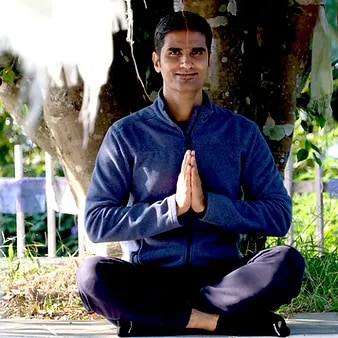The Essence of Bhakti Yoga Explained
by Hardik Mehta

In the vast spectrum of yogic practices, Bhakti Yoga stands out as a path of profound devotion, offering seekers a direct route to spiritual fulfilment and inner peace. Rooted in ancient Hindu scriptures, Bhakti Yoga emphasizes the cultivation of love, reverence, and surrender to the divine. In this comprehensive guide, we delve into the essence of Bhakti Yoga, exploring its principles, practices, and transformative potential.
Understanding Bhakti Yoga:
Bhakti, derived from the Sanskrit word “bhaj,” means devotion or love. Bhakti Yoga is the path of devotion, wherein practitioners establish a personal relationship with the divine through various means such as prayer, chanting, worship, and service. Unlike other paths of yoga that focus on discipline, control, or introspection, Bhakti Yoga centres on heartfelt devotion as the primary means of spiritual realization.
Key Principles of Bhakti Yoga:
- Love and Devotion: At the core of Bhakti Yoga lies unconditional love and devotion towards the divine. Practitioners develop an intense longing for union with the divine, viewing the object of their devotion as the ultimate source of love and fulfilment.
- Surrender (Prapatti): Surrendering to the divine will is a fundamental aspect of Bhakti Yoga. Practitioners relinquish their ego and desires, placing their trust entirely in the divine. This surrender is not passive but is marked by active participation in divine service and devotion.
- Unity in Diversity: Bhakti Yoga acknowledges the diversity of divine forms and expressions. Practitioners may choose a specific deity or form of the divine to whom they feel drawn, recognizing that all forms ultimately represent the same underlying reality.
- Grace (Anugraha): Central to Bhakti Yoga is the concept of divine grace. Practitioners believe that spiritual progress is not solely dependent on individual effort but is facilitated by the grace of the divine. Through sincere devotion, practitioners attract the divine grace, which aids them on their spiritual journey.
Practices of Bhakti Yoga:
- Bhajans and Kirtans: Singing devotional songs (bhajans) and chanting the names of the divine (kirtans) are common practices in Bhakti Yoga. These melodious expressions of devotion help purify the mind, awaken the heart, and foster a deep connection with the divine.
- Puja and Rituals: Ritual worship (puja) involving offerings of flowers, incense, and food to the deity is a tangible way for practitioners to express their devotion. Through ritualistic practices, practitioners create a sacred space for communion with the divine.
- Seva (Selfless Service): Service to others, known as seva, is considered an essential aspect of Bhakti Yoga. By selflessly serving others and seeing the divine in all beings, practitioners purify their hearts and deepen their sense of interconnectedness.
- Reading Sacred Texts: Studying scriptures such as the Bhagavad Gita, Ramayana, or the Bhakti Sutras provides inspiration and guidance for Bhakti practitioners. These texts offer timeless wisdom and insights into the nature of devotion and divine love.
The Nine Forms of Devotion
Central to Bhakti yoga are the Nine Forms of Devotion, a framework delineating the various ways in which devotees can express their love and dedication to the divine.
- Sravana (Hearing): Listening to sacred texts, hymns, and discourses that speak of the divine.
- Kirtana (Singing): Chanting praises and devotional songs in honour of the divine.
- Smarana (Remembering): Continuously remembering the divine through meditation, prayer, and contemplation.
- Padasevana (Service): Serving the divine in various forms, such as serving the deity in temples or serving humanity as an act of devotion.
- Archana (Worship): Performing rituals and ceremonies to worship the divine, often involving offerings of flowers, incense, and prayers.
- Vandana (Prostration): Bowing down before the divine as a gesture of humility and reverence.
- Dasya (Servitude): Surrendering oneself completely to the will of the divine, acting as a humble servant.
- Sakhya (Friendship): Developing a personal and intimate relationship with the divine, akin to friendship.
- Atma-nivedana (Self-surrender): Offering one’s entire self—body, mind, and soul—to the divine, merging one’s identity with the divine.
These Nine Forms of Devotion provide a comprehensive guide for devotees to cultivate a deep and intimate relationship with the divine, ultimately leading to spiritual liberation and enlightenment. Through the practice of these forms, devotees immerse themselves in the ocean of divine love, experiencing the bliss of union with the Supreme.
Benefits of Bhakti Yoga:
- Emotional Healing: Bhakti Yoga provides a nurturing space for emotional healing and catharsis. Through the expression of heartfelt devotion, practitioners release pent-up emotions, experience inner peace, and cultivate emotional resilience.
- Spiritual Fulfilment: By establishing a deep and personal connection with the divine, practitioners experience profound states of spiritual bliss and fulfilment. Bhakti Yoga offers a direct path to transcendental experiences and union with the divine.
- Community and Support: Bhakti Yoga fosters a sense of community and belonging among practitioners. By coming together to chant, worship, and serve, practitioners find support, inspiration, and encouragement on their spiritual journey.
- Integration of Mind, Body, and Spirit: Bhakti Yoga integrates the mind, body, and spirit in the pursuit of spiritual realization. Through devotional practices, practitioners harmonize their thoughts, emotions, and actions, leading to holistic well-being.
In a world marked by materialism and distractions, Bhakti Yoga offers a timeless path to spiritual awakening and inner transformation. By cultivating love, devotion, and surrender to the divine, practitioners embark on a journey of self-discovery, culminating in the realization of their true nature. Whether through heartfelt prayers, soul-stirring chants, or selfless service, Bhakti Yoga invites seekers to embark on a sacred pilgrimage towards the ultimate goal of union with the divine.
Embrace the path of Bhakti Yoga, and unlock the boundless potential for spiritual growth, fulfilment, and eternal bliss.
Experience the pinnacle of spiritual growth with Sayujya Yoga, acclaimed as Mumbai’s best yoga course. Blending traditional wisdom with modern insights, our unique approach integrates classical practices like Bhakti Yoga and Ashtanga Yoga. Rooted in ancient philosophies, our courses offer a transformative journey that nurtures mind, body, and soul. Join us to explore the depths of yoga, delve into sacred teachings, and embark on a profound path of self-discovery and devotion. Sayujya Yoga is your gateway to holistic well-being and spiritual fulfilment in the bustling heart of Mumbai.
About the Author

Hardik Mehta
Hardik is an E-RYT 500 & YACEP (Yoga Alliance Continuing Education Provider), Yoga Alliance, USA. He has been practicing yoga for the last 9 years. Prior to finding his true calling in Yoga, he was working with various corporates for 12 years in the Retail and eCommerce sector.
